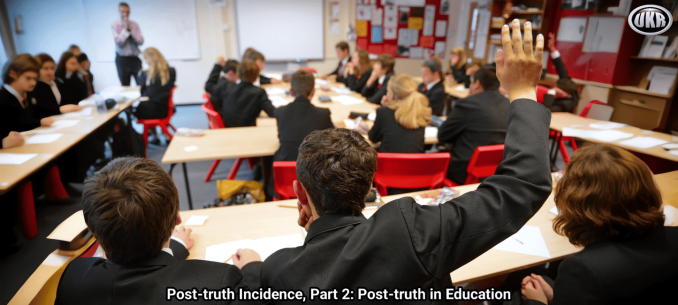
In the wrong hands, education becomes a powerful tool of indoctrination, replacing truth-telling with deceit and post-truth.
PROFESSOR GLORIA MOSS
The Emergence of Post-truth
The explosive and potential impact of education was well-understood by Nelson Mandela, who described it as “the most powerful weapon … to change the world”. He was not alone. The Renaissance playwright, Ben Johnson, stated that “without truth, all the actions of mankind are craft, malice … rather than wisdom”. In the 18th century, Geneva-born Jean-Jacques Rousseau believed that education could reinforce the inherent goodness in humans and society by being focused on honesty, virtue, and a strong sense of morality and ethics. In Britain, John Locke wrote in a letter to Anthony Collins in 1703, “To love truth for truth’s sake is the principal part of human perfection in this world, and the seed-plot of all other virtues”. In 19th century Prussia, philosopher and diplomat Wilhelm Humboldt believed that without cultivating the mind and character, searching for objective truth, and being well-informed, people could not be good craftworkers, merchants, soldiers, or businessmen. A consistent moral thread runs through this thinking from Prussia, France, and Britain.
A turning point came when Fabian Prime Minister James Callaghan, whose Cabinet were likewise all Fabians, launched the Great Education Debate in 1976. There were aspects here to echo earlier thinking in its reference to the creation of “lively, inquiring minds and an appetite for further knowledge that will last a lifetime”, but the cuckoo in the nest was the reference to the role of education in preparing people for the economy. The tension between these two aims was left unresolved, but paved the way not only for the National Curriculum introduced in 1988, but also for greater government control of the ‘secret garden’ that had been the special preserve of the teaching profession.
Some 40 years later, in 2016, writer Dr Jon Berry revisited the elephant in the room: whether education is a liberal humanist project or one designed to develop human capital. He asked: “Do we want a system that produces well-rounded individuals, flexible in their thinking, able to adapt a range of skills to a variety of circumstances … or [is] school about preparing young people to become part of a workforce?”
Four years later, the puppet masters at the World Economic Forum (WEF) declared in their report on schools for the Fourth Industrial Revolution that:
Primary and secondary school systems have a critical role to play in preparing the global citizens and workforces of the future. Education models must adapt to equip children with the skills to create a more inclusive, cohesive and productive world … In addition to ‘hard’ skills, such as technology design and data analysis, it is crucial that schools also foster human-centric skills — cooperation, empathy, social awareness and global citizenship — that enable children to shape future societies that are inclusive and equitable.
Completely absent are the aspirational goals of earlier generations to develop ‘curiosity’, ‘inquiring minds’, ‘truth’ or ‘character’, all replaced by this vapid model of ‘global citizenship’. Equally shocking is the appearance on the WEF website of an article by the Pro-Vice-Chancellor for External Affairs at Oxford University and a Professor at Queensland University on the role of universities in society. Before you read on, ask yourself what these aims should be and then compare with the professors’ views: “Through their engagement, teaching and research, universities must redouble their efforts to work alongside corporations, governments and NGOs as they search for new business models and policies to assist ‘the Great Reset’”.
Really? The Great Reset is focused on ‘sustainability’ and supporting the transformative impact of AI, so this statement would wrench education away from any ideal of ‘cultivating’ the mind or character. As if this were not bad enough, a number of ‘top’ universities are members of a WEF ‘Global University Leaders Forum’ (GULF) which brings together ‘top’ institutions including Oxford, Cambridge, and Imperial College in the UK, and Harvard, Yale, Princeton, Stanford, McGill, Columbia, Berkeley, and another six universities in the US. The net result? Universities are in hock with global interests.
Just when you think that we’ve reached the nadir, the WEF publishes its 2023 vision of education for the Fourth Industrial Revolution: the role assigned to education is limited to ensuring that “skills acquired during early childhood, primary and secondary education continue to be developed and defined in the workplace”.
And to leave you with no doubt that we’ve reached the depths, the WEF hammered home the priorities for Education 4.0 (i.e. for the Fourth Industrial Revolution):
Most education taxonomies that pertain to childhood through secondary education identify three primary groups of aptitudes: (1) abilities and skills, (2) attitudes and values, and (3) knowledge and information. The Education 4.0 Taxonomy places particular focus on the former two categories, as experts and employers indicate that these learning areas will require additional emphasis in future education systems relative to the emphasis they get today.
So, between the Great Education Debate of 1976 and WEF policy in 2023, ‘knowledge and information’ have formally been erased from educational priorities. Welcome to post-truth in education today.
Decades in Preparation
How did we arrive here? At least ten factors have played a role, and we present them in no particular order, knowing that reversing a good proportion would restore truth and virtue to their rightful place as the cornerstone of an education.
Early Years Pedagogy
Who is not familiar with the words, ‘Give me a child until the age of seven, and I’ll give you the man’? This quote, attributed to Aristotle and St. Ignatius Loyola, shifts our focus to early years learning. Psychologist Dr Richard House has written about the effects of a target-driven culture on children, asking whether a learning outcomes-based ‘surveillance’ culture cascading down to the earliest of ages could have an unconscious impact on children’s development and understanding of the world. He is not alone. Lynne Oldfield writes of ‘the Rights of the Child … to be a dreamer’, and American child psychologist, David Elkind, author of the classic 1981 book The Hurried Child: Growing Up Too Fast Too Soon, has concerns about blurring the lines of what is age-appropriate.
Who cannot be concerned about the books now appearing in schools and libraries? Yes, the overt sexualisation of books is alarming, but also is the lack of moral content. We will have a look at two examples.
The first is Little Red Riding Dude by Olly Pike (2022), a book aimed at children ages 5-7. This tells the tale of a boy named Christopher who lives with his uncle and sister on the edge of the forest. People warm to him because he is kind and always dresses up in something fantastic at the annual Pride Festival (he is depicted in trousers and also a skirt). Christopher’s uncle asks him to take decorations to his grandmother for the annual Pride Festival and on the way, he meets a wolf (wearing a dress), and Christopher invites ‘Mr Wolf’ to join him on his way.
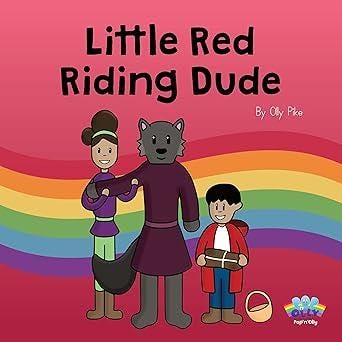
On seeing the dress worn and made by the wolf, the grandmother comments, “What fabulous talent you have” and the book ends with the message that “It matters not if a wolf wears a dress and just be yourself and wear what’s inside. And always remember, have pride”.
Should this mélange of gender identities be offered to children aged 5-7? It may carry the veneer of a fairy tale — it begins with the traditional ‘Once Upon a Time’ — but all trace of these tales’ role in teaching the importance of avoiding evil has disappeared. This means that the child is not taught the importance of defeating harmful and destructive forces, with the main lesson in Little Red Riding Dude being the importance of supporting people with illusory beliefs. This is to prioritise subjective reality over a more ‘objective’ morality, promoting a moral relativism which could leave children morally disabled.
Other problematic elements include the lack of reference to any parents of Little Red Riding Dude, with his ‘family’ said to consist only of an uncle and a sister, thereby disappearing the mother and the father, and the authority that those of the child reading the story may exercise. Note also that the skin colour of all the characters is brown, not white. Add to this all, the stark, plain nature of the illustrations and the unadorned language, with nothing here to educate young minds into the wonders of literary and visual beauty.
The removal/obscuring of notions of good and evil is also present in the books about by Harriet Muncaster about Isadora Moon, half vampire and half fairy, published by Oxford University Press. These books have been translated into 40 languages, with sales of over 5 million. What damage will these do to children’s ability to differentiate between good and evil?
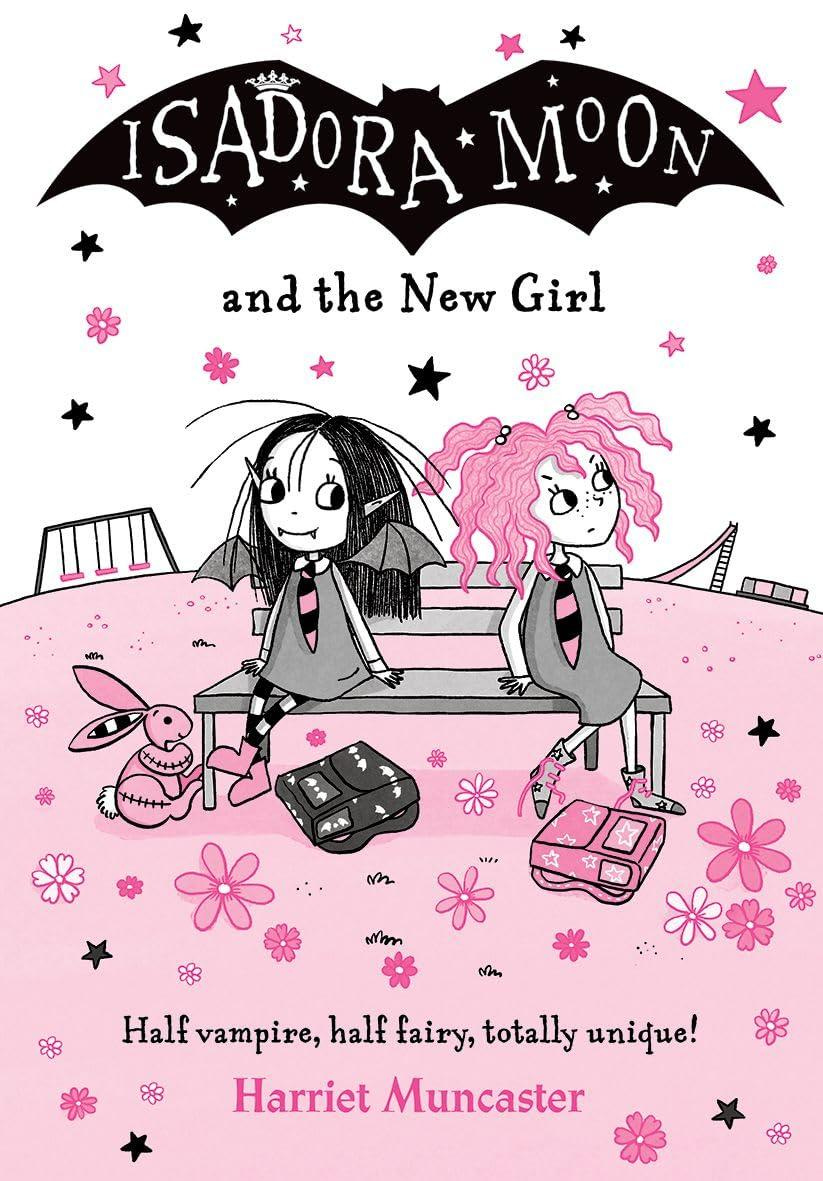
We know how early experience and caregiver-child relationships influence the development of community-minded maturation. If we consider the effect that children’s books with no moral compass might have on children’s attitudes, then we might hypothesise that they might eradicate a sense of right and wrong from younger generations with relative ease.
Back in 2010, research by Sara Konrath with Edward O’Brien revealed that empathy, the backbone of compassionate moral behaviour, had decreased among US college students with levels of empathy 40 percent lower than their counterparts of the late 1970s. Konrath commented on the students of 2010 as “one of the most self-centered, narcissistic, competitive, confident and individualistic in recent history”. O’Brien added that it was surprising that this “growing emphasis on the self was accompanied by a corresponding devaluation of others”.
Could contemporary books like the two above be accentuating this trend, and what effects will this have on teaching truth?Given what we know about Bandura’s Social Learning Theory (how people learn through a process of imitation), children are very likely to learn not just from the adults around them, but also from the books that they read. If these books present a subjective world view, one in which good and evil are not acknowledged, then these books will lead to a diluted sense of right and wrong as well as a lack of concern with objective, rather than subjective, reality. This can only strengthen the post-truth world.
Pre-defined Knowledge
The National Curriculum was created in 1989 under the Education Reform Act 1988 and revised in 2014 to create what Michael Young and Johan Muller have described as “knowledge-rich curriculum”. Once you are aware of Professor David Lambert’s view that “rich” knowledge promotes “an unchanging canon of facts, even though the rate of production continues to accelerate relentlessly”, and how this leads to what psychologist Dr Richard House refers to as “cultural stasis”, you might perceive the importance of a ‘Future 3’ model of education in which knowledge is viewed as fallible. Until such a model is accepted, education will be anchored in what Harvey has termed “status quo theory”, with the system reinforcing the prevailing ideological hegemony, rather than opening up humanistic “transitional spaces” in which genuine growth, change, transformation, and new thoughts can occur.
Audit Culture
The National Curriculum brought with it an audit culture, that, according to therapist Andrew Cooper, brought with it:
… a relentlessly superintended world, a quangoed regime of commissioners, inspectors, and regulators … [and] important questions of truth, meaning and authenticity are sacrificed on the altar of compulsive reassurance of the critical superintendent … Fundamental principles about freedom, autonomy, and citizenship are threatened by this state of affairs … Obsessional activity … is essentially about control rather than creativity … These systems may be contributing to a deterioration of standards, while maintaining a pretence that they are achieving the opposite.
Dr Richard House has sagely commented on the psychological effect of “audit-mindedness”, a state that in his view “colonises the psyches of everyone in the system — including children and students”, for pupils and students have literally been “schooled” in a system that is preoccupied with, and dominated by, examinations, “high stakes” tests, and an associated and all-pervasive culture of “teaching to the test”.
It is difficult to conceive of how such a culture could deliver a ‘Future 3’ education with deep roots into the questioning of status quo knowledge.
The Woke Agenda
In August 2023, a professor of sociology at Bucknell University in Pennsylvania, Alexander Riley, described the creep of woke thinking in higher education, writing that: “Over the past several decades, institutions of higher education have been steadily adopting more and more ideas and practices destined … to transform them, the goal being greater diversity, inclusion and equity”. He leaves no doubt as to the grim consequences: “The view of the university as a site for radical moral and political propagandizing is getting stronger every day, steadily erasing the traditional view that the mission of higher education is the pursuit of objective truth”.
Examples? In October 2023, the American Anthropological Association and the Canadian Anthropology Society cancelled a panel on the importance of biological sex as a social and scientific category at its annual conference. On the other side of the pond, in the same month, the UK’s Secretary of State for science, innovation and technology, Michelle Donelan, told a party conference that the Government would protect scientific research “from the denial of biology”, claiming that scientists are being “told by university bureaucrats that they cannot ask legitimate research questions about biological sex”.
Given the extent to which biological sex is hardwired into all five senses, you might have expected the world of academe to rejoice. Instead, over 2,000 UK scientists signed an open letter denouncing Donelan’s comments on the basis that they “do not reflect the view of UK scientists”. They quoted the 0.5 percent of the population who do not identify with the sex registered at birth, referring to the 1.5 million people in the UK that combine Differences in Sex Development (DSD), intersex, non-binary, and trans characteristics, stating that the Government’s views would be to shut down research into the implications for these people in biomedical and sports science.
This letter ignores the fact that the totality of non-binary groups represents a minority when compared to the population as a whole, for whom the minister’s comments still stand. Notwithstanding this, a large element in UK academia are resistant to discussion of biological sex, even though it is strongly evidenced in the medical, psychological and biological, literatures. Are they captured in a post-truth academic world?
Dodgy Data
Post-truth is alive and well in some of the world’s top universities, fuelled by repeated instances of dodgy data. And some of the most senior academics have been implicated, including a recent former president of Stanford University, Dr Tessier Lavigne, who was caught not correcting errors in peer-reviewed journal papers.
Then, the oldest university in the US, Harvard, dating back to 1636, in second position to Oxford in the Times Higher Education league table, was in the university headlines when a senior professor, Francesca Gino, was accused of falsifying data in papers on her research on honesty! And, since her work was co-authored by academics from Northwestern, Duke, Southern California, Toronto University, and Harvard, these institutions have egg on their face too. The same also for the high-ranking journals that published the work (the American Psychological Association’s Journal of Personality and Social Psychology and the journal Psychological Science) without questioning the data.
The rot at Harvard extends to the Dana-Farber Cancer Institute, as you can see in the table below:
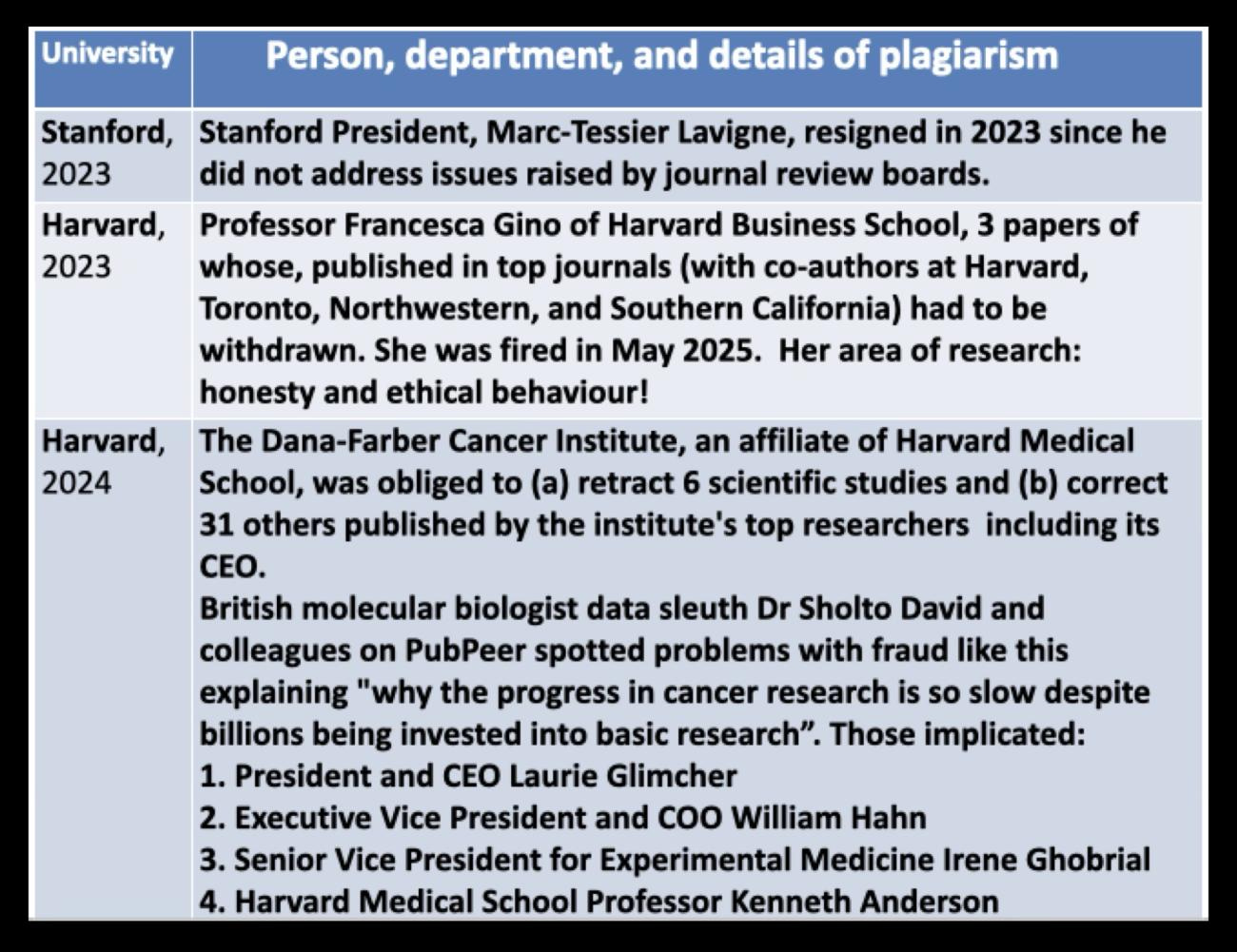
So, if the main raison d’être of a university is research, how can these institutions resist the accusation of following a post-truth agenda? One of the papers of the Farbar Institute used bogus AI-derived images.
Funding
Who pays the piper, calls the tune, and so the raising of university fees and creation of student debt (see table below) has put students in the driving seat. They are now ‘customers’ with high expectations, including getting top grades, so is it surprising that Queen Mary College, London in 2018 investigating lecturers who awarded less than a 2:1 average for their students’ work. The following graph shows the decline in state funding in Britain in 2010-2023:
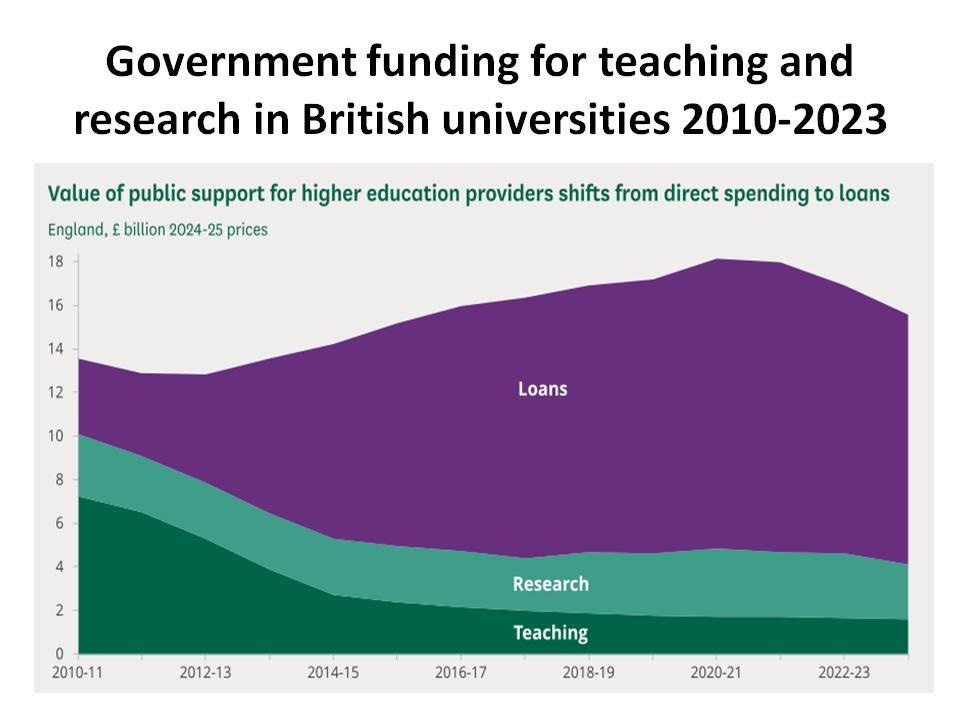
The shortfall in government funding is being replaced by private monies, with details of funding from Bill Gates and the Wellcome Trust shown below:
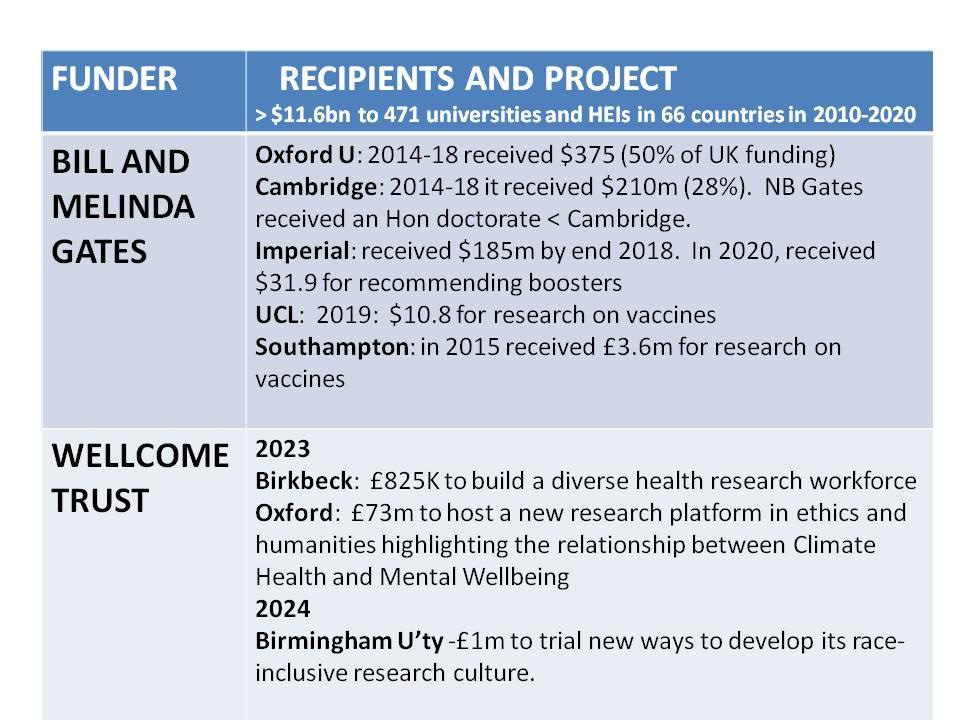
Gates boasted that investment in vaccines can deliver a 20-fold return, and so is his funding to 471 universities in 2010-2020, much of it for work on vaccines, morally tainted?
State Control
Whilst in the early 19th century, universities were relatively autonomous cultural institutions whose role was to provide social critique, independent of the State, and with knowledge substantially being pursued for its own sake, what we now see is knowledge being commodified to make it a useful product that has been pre-ordained and pre-conceived, not necessarily for the sake of science, truth, or knowledge. Remarkably, back in 1919, Rudolf Steiner predicted that this would happen:
The State will tell us how to teach and what results to aim for, and what the State prescribes will be bad. Its targets are the worst ones imaginable, yet it expects to get the best possible results. Today’s politics work in the direction of regimentation, and it will go even further than this in its attempts to make people conform. Human beings will be treated like puppets on strings, and this will be treated as progress in the extreme. Institutions like schools will be organised in the most arrogant and unsuitable manner.
The reality, decades later? Professor Stephen Ball, formerly at the Institute of Education, wrote in 2003 of the struggles that would occur “over the control of the field of judgement and its values”. Here now in 2025, it is appropriate to remember how in the 1970s in Cambodia under the rule of Pol Pot and the Khmer Rouge potential opponents with more than elementary education were killed and almost every educated city-dweller were suspect. It’s no surprise that academics were killed for being academics or even for merely wearing eyeglasses, since it suggested literacy.
We are not alone in warning of attacks on intellectual activity — the very thing that can deliver us from post-truth — as discussed in the next section.
Post-truth through Indoctrination
Another siren voice, that of Alex Newman, speaks of rescuing children from an evil, diabolical education system in the US, responsible for the “deliberate dumbing down, indoctrination and sexualisation of children”. He describes the indoctrination of children as a “global phenomenon”, given the “power inherent in moulding young minds”. He implicates Robert Owen, Horace Mann, and educationalist John Dewey, and although his focus is on America, much of what he says resonates here. I say this since I examined the content of secondary school textbooks used in Britain and found these to be laced with global agendas and disinformation. Part of what also became apparent was the dumbing down across the board, which is the subject of the next section.
Ever-reducing Standards
In terms of ‘A’ level maths, a report by Dr Jones and Matthew Inglis, Professor in Mathematical Cognition at Loughborough University, with Chris Weadon compared ‘A’ level Maths exam answers from 66 papers (yes, actual exam scripts) taken from 1964, 1968, 1996, 2012 and 2016. The findings from this study highlighted a substantial decline in standards since the 1960s, with the standard of answer receiving a grade ‘B’ in 2016 being awarded the equivalent of a grade ‘E’ in the 1960s.
Where Modern Languages are concerned, a study in 2008 compared the vocabulary recall of former ‘O’ level candidates (across the wide range of marks available) with the best 24 candidates from a cohort of 449 GCSE students in 2006. The study’s author, Milton, concluded: “GCSE Higher is a considerable downgrade from O-level. Today’s learners end up being considerably less proficient than in pre-GCSE times”. As if this is not bad enough, a blog by ‘Determined Linguist’ from April 2021 reports that a comparison of the word limit of 1,700 words prescribed for Higher Tier GCSE and a French vocabulary book written by Thimann for Ordinary Level in 1965 highlights a substantial decline in standards. Here are the words of the Determined Linguist:
Higher tier students will be given a vocab list at least 44% smaller than the vocab list for O-level – and that’s a conservative estimate.
This disparity is actually very similar to the difference in attainment observed by Milton: in his study, GCSE learners knew 40% fewer words than their O-level counterparts did 20-40 years post-hoc. This new proposal engineers in a continuous decline in standards.
Now to university standards. You can see the explosion of first class degrees since 2010, the year that student fees rose to £9000 and a culture developed in which students were treated as customers:
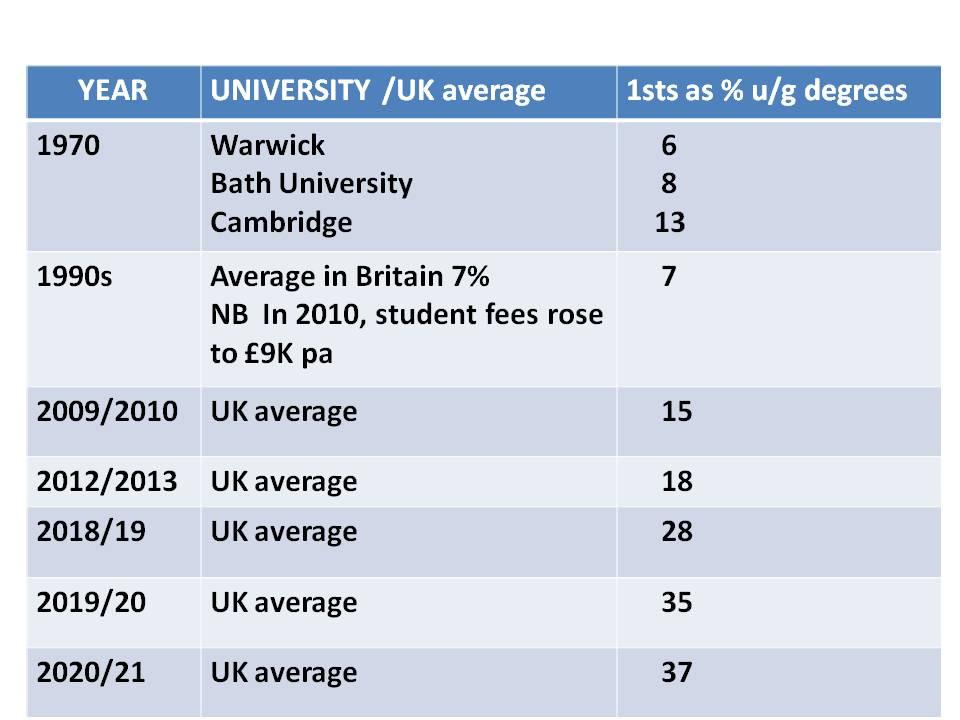
When looking at this table, remember that when considering average figures, that there will be universities that produce higher levels of firsts. For example, in 2023, almost half of new graduates from Imperial College were awarded a first class degree (48.5 percent) and the figure was 47 per cent at UCL.
Of course, we might think that this increase in first class degrees is testament to enhancements in intellectual ability, but the decline in standards at school level makes this unlikely. What is more, if we look at admissions into the subject of medicine, which has always required ‘high’ grades (AAA), we are seeing ‘contextual admissions’ allowing students with lower grades than required for Medicine (e.g. BCC) being admitted through the back door onto a Foundation degree and thence onto a full medical degree at Bristol and Sheffield universities. The aim is to expand entry from disadvantaged backgrounds as part of a policy of “contextual admissions”. Will this come at the expense of truth in medicine?
Attacks on Free Speech
The epidemic of attacks on free speech is running unchecked in education, facilitating the move to post-truth. You can get a sense for the range of topics that are in the firing line from the examples presented in the following table:
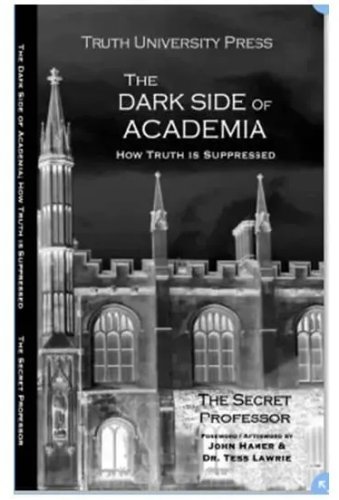
Peer Review
The final nail in the coffin of truth is the peer review system, one begun by Robert Maxwell in the 1950s. Fresh from the Army, he bought up publishing businesses to launch his own Pergamon Press, even seeking funding from three-letter agencies. Peer review is pivotal in the academic system, with academic posts in high ranking universities requiring publication in ‘top’ journals that are narrow in focus. In the medical field, top journals are proven to reject innovative work, and what better way to guarantee that academics do not stray from mainstream truths?
One brave and brilliant academic, Dr David Horrobin, established a journal Medical Hypotheses, with an editor-in-chief and no peer review board. You can read the shocking story in The Dark Side of Academia: How Truth is Suppressed, including how the journal presented an article questioning the origin of the AIDS virus. Pressure from the NIH forced out the editor and led to the installation of peer review.
Conclusion
The threat of post-truth in education, from early years right up to higher education, is very real. Only with root and branch reform — or better still revolution — can the search for virtue, honesty, and objective truth be restored to its rightful place at the heart of education.
This article (Post-truth Incidence, Part 2: Post-truth in Education) was created and published by UK Column and is republished here under “Fair Use” with attribution to the author Professor Gloria Moss

••••
The Liberty Beacon Project is now expanding at a near exponential rate, and for this we are grateful and excited! But we must also be practical. For 7 years we have not asked for any donations, and have built this project with our own funds as we grew. We are now experiencing ever increasing growing pains due to the large number of websites and projects we represent. So we have just installed donation buttons on our websites and ask that you consider this when you visit them. Nothing is too small. We thank you for all your support and your considerations … (TLB)
••••
Comment Policy: As a privately owned web site, we reserve the right to remove comments that contain spam, advertising, vulgarity, threats of violence, racism, or personal/abusive attacks on other users. This also applies to trolling, the use of more than one alias, or just intentional mischief. Enforcement of this policy is at the discretion of this websites administrators. Repeat offenders may be blocked or permanently banned without prior warning.
••••
Disclaimer: TLB websites contain copyrighted material the use of which has not always been specifically authorized by the copyright owner. We are making such material available to our readers under the provisions of “fair use” in an effort to advance a better understanding of political, health, economic and social issues. The material on this site is distributed without profit to those who have expressed a prior interest in receiving it for research and educational purposes. If you wish to use copyrighted material for purposes other than “fair use” you must request permission from the copyright owner.
••••
Disclaimer: The information and opinions shared are for informational purposes only including, but not limited to, text, graphics, images and other material are not intended as medical advice or instruction. Nothing mentioned is intended to be a substitute for professional medical advice, diagnosis or treatment.
Disclaimer: The views and opinions expressed in this article are those of the author and do not necessarily reflect the official policy or position of The Liberty Beacon Project.






Leave a Reply